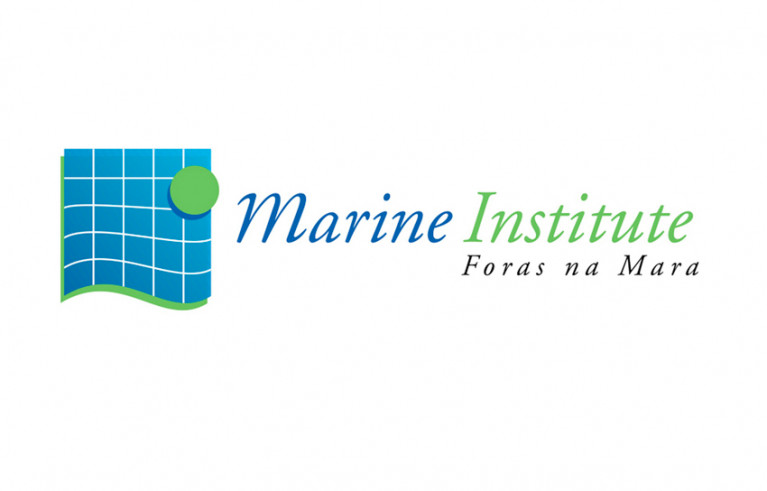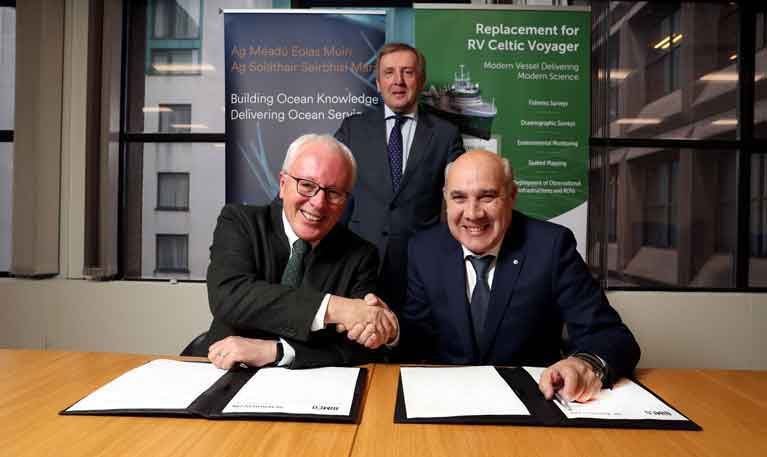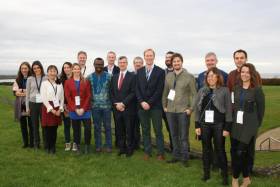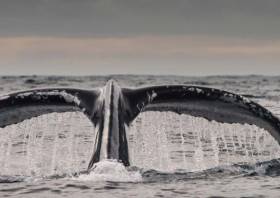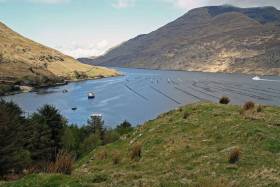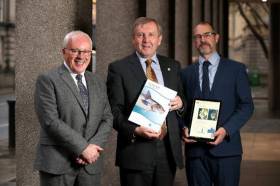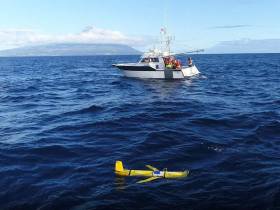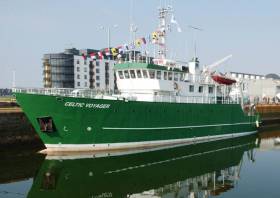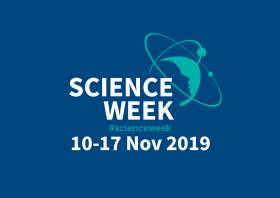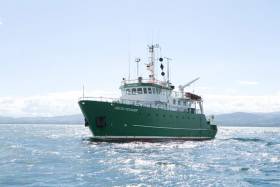Displaying items by tag: Marine Institute
Ocean Energy Is Greatest Opportunity For Growth Of Blue Economy, Survey Says
Ocean energy is the greatest opportunity for the growth of Ireland’s maritime or ‘Blue’ economy, according to a new survey produced as part of the Our Ocean Wealth Summit.
As the Irish Examiner reports, the survey commissioned by the Marine Institute and PwC says more than 80% of leading voices in the maritime sector are “confident in its future growth potential”, in the words of PwC partner Declan McDonald.
Apart from offshore energy developments in wave and wind power, the survey highlights potential in maritime tourism, aquaculture, sea fisheries, biotechnology and shipping.
The Irish Examiner has much more on the story HERE.
Spanish Shipyard to Build Ireland’s New Marine Research Vessel
The Marine Institute and Spanish shipyard Astilleros Armon Vigo S.A. have signed a contract for the construction of Ireland’s new state-of-the-art marine research vessel, following the completion of the design of the vessel by Skipsteknisk AS of Norway. This is a significant milestone with the build process contracted to complete in 2022.
As Afloat reported previously, the new ship Supporting the Government’s national integrated marine plan, Harnessing Our Ocean Wealth, as well as the national Marine Research and Innovation Strategy, the new 52-metre research vessel will form a critical part of the State’s maritime infrastructure. It will replace the RV Celtic Voyager and will be a sister ship to Ireland’s larger research vessel, the 65-metre RV Celtic Explorer.
The new vessel will support Ireland in addressing some of the research challenges of Brexit and the Common Fisheries Policy, as well as climate-induced impacts on our oceans. It will facilitate service demands under the European Maritime Fisheries Fund (EMFF) including the conservation, management and rebuilding of fish stocks and the long-term sustainable harvesting of marine biological resources. It will greatly enhance the Institute’s many research and data gathering activities in areas like marine biodiversity, marine spatial planning and ocean observation and monitoring. The vessel will also support a diverse range of marine operations, such as maintaining and deploying Ireland’s Marine Data Buoy Network which supports Met Éireann’s daily weather forecasts.
The new research vessel will be a modern, multipurpose, silent vessel, capable of operating in the rough seas of the Irish Exclusive Economic Zone (EEZ). It will be designed to incorporate the latest proven technologies to ensure that it operates as efficiently as possible, ensuring minimal fuel consumption and minimising the vessels environmental impact and carbon footprint.
Welcoming the signing of the contract to construct the new research vessel, Minister for Agriculture Food and Marine, Michael Creed TD said:
“This project, when completed, will ensure that the important work of the Marine Institute, including vitally important fisheries and oceanic research initiatives, which are also important in the context of Climate Action, will be significantly enhanced through the commissioning of a state-of-the-art new fuel-efficient research vessel. I am delighted that my Department has been able to provide the necessary capital funding to the Marine Institute to enable the new vessel to be delivered within the anticipated three-year timeframe.”
Dr Paul Connolly, CEO of the Marine Institute welcomed the signing of the research vessel build contract stating:
“This is an incredibly exciting moment in our ocean science history. The new national research vessel will allow Ireland to make a major leap forward in our understanding of the Atlantic. As we enter the UN Decade of the Ocean (2021 to 2030) it will ensure that Ireland continues to build our ocean knowledge and enhance our scientific understanding.”
“The significantly enhanced capabilities of the new research vessel will support a broad range of ocean stakeholders including policymakers, managers, industry, researchers, educators, students, coastal communities and the public. This knowledge is essential if we are to sustainably manage our oceans and empower Ireland and its people to safeguard and harness our ocean wealth.”
Based in Galway, the vessel will be used by the Marine Institute, other State agencies and Third Level Institutes to undertake fisheries, plankton, oceanographic and environmental research and surveys, as well as student training. It will enable Ireland to continue building on our achievements as leaders in seabed mapping. It will also allow for continued transatlantic surveys with international partners through AORA (Atlantic Ocean Research Alliance) and other collaborations, as well as research survey programmes funded through EU Horizon2020.
The new research vessel will be built at Armon’s shipyard facility in Vigo, Spain. The Spanish shipbuilding company Armon, have a reputation as a builder of highly advanced vessels, with more than 900 ships built and in service throughout the world’s oceans. The yard recently built the RV Svea, a 70-metre research vessel delivered to the Swedish University of Agricultural Sciences.
Mick Gillooly, Director of Ocean Science and Information services, Marine Institute highlighted that the nature of marine equipment has changed significantly since the launch of Ireland’s first research vessel, the RV Celtic Voyager back in 1997.
“This new research vessel will be one of the most advanced marine research vessels in the world. It will provide scientists with state-of-the-art facilities and technologies to undertake crucial research that will deepen our understanding of the oceans.”
The new research vessel will be 52 metres long and will be engineered to endure harsh conditions and the punishing weather encountered in the North-East Atlantic and will be able to spend 21 days at sea. In addition, this new vessel will be a silent research vessel, and will be designed to meet the stringent criteria of the ICES 209 noise standard for fisheries research. It will also support the remotely operated vehicle (ROV) and autonomous underwater vehicle operations, which enable the exploration of our deep ocean down to 3,000 metres.”
Symposium Celebrates 10 Years Of Marine Economics & Policy Research
The 10th Annual Marine Economics Policy Research Symposium, recently held at the Marine Institute’s Oranmore headquarters, provided a forum for researchers, scientists, economists and policy makers to present and exchange views on a wide range of topics.
Organised by the Socio-Economic Marine Research Unit (SEMRU) of NUI Galway’s Whitaker Institute with the support of the Marine Institute, the event was a space to discuss issues from the public perceptions of the oceans and marine spatial planning to marine and coastal tourism.
The 10th annual symposium also showcased the international collaborations that have been established between SEMRU and partner institutes through a number of EU projects.
The Marine Institute’s new chief executive Dr Paul Connolly welcomed the researchers, noting that SEMRU “has played a vital role in establishing a sustainable method of valuing our oceans”.
He added that the unit has “also undertaken complex research initiatives across a broad spectrum of areas, such as fisheries, maritime transport tourism and natural capital accounting”.
“Today, economic evidence is available to show the value — market and non-market — of our ocean resources with Ireland's marine sector recognised by Government and the State as an important national asset,” he said.
SEMRU presented the latest economic figures to Government in June 2019 as part of the Our Ocean Wealth Summit.
The latest figures show that Ireland’s ocean economy had a turnover of €6.23 billion and provided employment for 34,132 people (full time equivalents). The total direct and indirect value of Ireland's ocean economy is estimated by SEMRU to be in excess of €4.2 billion GVA (Gross Valued Added), equivalent to 2% of GDP.
Ireland’s integrated marine plan, Harnessing Our Ocean Wealth, outlines the Government’s target to increase the turnover from our ocean economy to exceed €6.4 billion by 2020 and double its value to 2.4% of GDP by 2030.
The symposium welcomed speakers from the Marine Institute; NUI Galwa; Department of Housing, Planning and Local Government; Údarás na Gaeltachta; Galway-Mayo Institute Technology; Trinity College Dublin; Queen’s University Belfast; and ABPmer.
Top women’s surfer turned marine biologist Dr Easkey Britton was among the international list of speakers whose presentations are available to download from the SEMRU website HERE.
New Online Resources Bring ‘Ireland’s Deep Atlantic’ Into The Classroom
TV documentary Ireland’s Deep Atlantic will feature in new online classroom resources for Junior Cert students, it has been announced.
Ireland’s Deep Atlantic — produced by Sea Fever Productions and supported by the Marine Institute, BAI and the Environmental Protection Agency — sees filmmaker Ken O'Sullivan embark on a series of voyages in the North Atlantic in search of blue whales, sharks and deep-water coral reefs.
O’Sullivan filmed part of the series on board the Marine Institute’s research vessel the RV Celtic Explorer and documented coral reefs at a depth of 3,000 metres using the ROV Holland 1.
The series joins two other Irish-produced and publicly funded TV programmes used to create the new online classroom resources.
Business Studies students will use the series, including video clips of the RV Celtic Explorer and scientists, to learn about consumer behaviour and sustainable development, and the impact of economic growth on society and the environment.
Geography students, meanwhile, will learn about the ‘Real Map of Ireland’ and the importance of Ireland's ocean territory. The students will also learn about the exploitation of water, fish stocks, forestry, and soil and the relationships between the physical world, tourism and transport.
Ken O’Sullivan welcomed the new resources, saying: “It’s just wonderful now to realise that every teenager in Ireland will see our beautiful, fertile oceans and learn not just about the rich life within them, but the impact of human behaviour on our oceans with things like consumer spending habits, marine plastics and also the value of eco-tourism to coastal communities.
“Ireland’s Deep Atlantic is the first documentary to be used in this way and the platform has now been built for RTÉ to host many more publicly funded documentaries in this way for the secondary school education curriculum.”
Teachers and students can access the educational material and the programme clips referenced from the RTÉ Learn website.
New Research On Improving Biotoxin Monitoring In Shellfish
A postgraduate researcher is investigating the biotoxin production potential of Azadinium and related species in Irish waters, particularly in estuaries used for shellfish aquaculture such as Killary Harbour and Bantry Bay.
Stephen McGirr — a PhD candidate at the Institute of Technology Sligo and a Cullen Fellow at the Marine Institute — is studying Azadinium, a planktonic single-celled plant that lives in marine waters around Ireland.
Under certain conditions, Azadinium produces biotoxins which can build up in shellfish that feed on them. If eaten by humans, this can lead to shellfish poisoning.
Understanding more about the biology of this species would help both the shellfish aquaculture industry and protect human health.
“The genus Azadinium was first linked to incidents of shellfish poisoning in the 1990s and both toxic and non-toxic forms of the Azadinium species have since been identified in Irish waters,” McGirr says.
“More knowledge of the biology of the species is needed to support monitoring efforts currently underway to assist the aquaculture industry.”
Ireland’s aquaculture industry employed 1,925 people on 288 aquaculture production units, according to Bord Iascaigh Mhara’s Business of Seafood Report 2018. In 2018 it is estimated that Ireland produced 24,200 tonnes of farmed shellfish valued at €56 million.
“Aquaculture is a valuable industry to our national economy as well as for many of Ireland's coastal communities,” McGirr adds.
“The closure of aquaculture production sites due to biotoxins produced by organisms such as Azadinium impacts the industry and can also be detrimental to local economies.”
Stephen’s research supports the Marine Institute's National Phytoplanton Monitoring Programme, which monitors phytoplankton populations and dynamics around the Irish coastline.
‘Aquaculture is a valuable industry to our national economy as well as for many of Ireland's coastal communities’
McGirr says the Marine Institute’s Cullen Fellowship Programme is giving him the opportunity to learn and develop his skillset, working alongside scientists who are experts in their field, as well as gaining hands-on experience using state-of-the art equipment in the Institute's laboratories.
“I have joined two surveys on the RV Celtic Voyager along the south and western coastline of Ireland to collect both water column and sediment samples for our analyses.
“I have also presented my research at international conferences, including the International Conference on Molluscan Shellfish Safety held in Galway and the International Conference on Harmful Algae, held in Nantes, France.”
McGirr is currently focusing his efforts on translating the product of his research into articles for peer-reviewed scientific journals. His research supervisors are Joe Silke, Marine Institute and Dr Nicolas Touzet, IT Sligo.
The Cullen Fellowship Programme builds marine research capacity and capability by equipping graduates with the skills and expertise in raising awareness about our ocean, as well as Ireland's rich marine biodiversity and ecosystems.
The programme has provided grant aid to the value of €2.06 million supporting 24 PhD and three MSc students over the last five years. The research addresses a number of the 15 research themes identified in the National Marine Research and Innovation Strategy 2017-2021.
This project (Grant-Aid Agreement No CF/15/01) is carried out with the support of the Marine Institute and funded under the Marine Research Programme by the Irish Government.
Marine Minister Receives Marine Institute’s Annual Stock Book For 2019
Marine Minister Michael Creed took receipt of the 2019 Marine Institute Annual Stock Book yesterday, Thursday 21 November.
One of the institute’s primary annual publications since 1993, the Stock Book provides scientific advice on commercial fish stocks of interest to Ireland.
“The fishing industry is a vital part of Ireland's ocean economy,” the minister said. “The information presented by the Marine Institute in the Stock Book is critical to the preparations for the annual Fisheries Council negotiations which this year will take place in Brussels on the 16th and 17th of December.
“The detailed stock-by-stock guide ensures we have the most up-to-date scientific advice on this renewable resource.”
The Stock Book forms an important component of the sustainability impact assessment presented to Dáil Éireann annually before the EU fisheries negotiations commence.
This year advice was given for 74 stocks, and results show continued improvement in the number of stocks that are sustainably fished
In addition, the Stock Book serves as a reference guide to the fishing industry, managers, marine scientists, environmental NGOs, third level institutes, financial institutions and the wider public.
Much of the scientific work that delivers the Stock Book is funded under the European Maritime Fisheries Fund scheme.
The Marine Institute says scientific advice and services provided by scientists to the Department of Agriculture, Food and the Marine are a key focus of its Strategic Plan 2018-2022.
“These scientific services are essential to supporting our sustainable ocean economy, protecting and managing our marine ecosystems and meeting EU obligations,” said Marine Institute chief executive Dr Paul Connolly.
The institute’s scientists participate in, and lead, many international working groups at the International Council for the Exploration of the Seas (ICES), which assess fish stocks and provide scientific advice on how much can be sustainably fished.
“ICES is a very important organisation for the Marine Institute where scientists from many countries share data and work together to deliver the impartial scientific advice required by the fisheries managers. This advice is presented in the Stock Book and is essential to sustaining our coastal communities,” Dr Connolly said.
The 2019 Stock Book is available as a PDF to read or download HERE, and also this year as an interactive map.
Irish Research Marine Glider Deployed In North Atlantic On New Project
The Marine Institute’s marine glider has been deployed in the North Atlantic as part of a deep ocean marine science research project.
Laochra na Mara can reach depths of 1,000m and collects oceanographic data on conductivity, temperature, depth, fluorescence, turbidity and dissolved oxygen.
The glider was deployed from the RV Águas Vivas as part of the fifth project meeting for the Innovation in the Framework of the Atlantic Deep Ocean (iFADO) project recently held in The Azores, Portugal.
Prior to deployment, the glider was exhibited to the public at the Horta Maritime Terminal where local school students met iFADO team members and viewed several videos about glider operations and missions.
The school students also wrote messages on the glider before it was launched.
“Equipped with a wide variety of sensors, the glider can gather information about ocean temperature, salinity and currents, and transmits this information to shore via satellite,” Thomas Dabrowski of the Marine Institute said.
“Gliders are able to provide real-time data, and provide a better assessment and understanding of our ocean environment.”
Gliders are programmed to surface at designated times and transmit the data collected while at the same time downloading new mission instructions. This two-way communication allows gliders to continually gather information about the most important and diverse regions of our ocean basins 24 hours a day.
Similar to a glider from the United States that was found off Baltimore in 2017, the Slocum glider was recently recovered in the North Atlantic Ocean after 15 days at sea — during which it covered over 250km and performed over 40 deep dives.
The fifth iFADO project meeting gathered 50 participants and partner leads to hear the latest results and discuss future co-operation and follow-up action.
The iFADO project aims to create marine services at regional and sub-regional scale using the EU’s Atlantic waters as a case study. It combines traditional monitoring with cost-effective state-of-the-art technologies such as remote sensing, numerical modelling and emerging observation platforms such as gliders and oceanic buoys.
The Marine Institute is one of 20 partners from Ireland, the UK, France, Portugal and Spain involved in the iFADO project. The project has received funding from the European Union’s Interreg Atlantic Area Programme.
Applications Open For EurofleetsPlus ‘Floating University’ In Cork Harbour
The EurofleetsPlus project is calling for applications from early-stage researchers of marine-related sciences to take part in a ‘Floating University’ on the RV Celtic Voyager next spring.
Applications are open until next Friday 22 November for the scheme co-ordinated in Ireland by the Marine Institute.
Mapping the Ocean Floor: An Introduction to Practical Aspects of Hydrographic Surveying will take place on board the RV Celtic Voyager in Cork Harbour from 19-25 February next year.
Teaching will focus on the operation of multi-beam echosounders and sub-bottom profiling and their applications for mapping and characterising the seabed. Offshore training will be supported by lectures, workshops and online resources.
On completion, participants of the Floating University will be able to demonstrate competence in designing and executing an offshore hydrographic survey, articulate understanding of the principles and methods applied to seabed surveying, as well as practice data acquisition and data processing for multi-beam echosounders and sub-bottom profiler systems.
Instruction will be from expert practitioners from the INFOMAR project with guest lecturers from the Marine Geology Research Group, University College Cork, and the National Institute of Oceanography and Applied Geophysics (OGS) in Italy.
A total of eight places are available for European postgraduate students (students of all nationalities enrolled at European universities) and online applications must be received by next Friday. Details of the Floating University and how to apply can be found HERE.
Marine & Climate Science On Show At Mayo & Galway Science Festivals
Marine science and ocean climate research will be showcased to mark Science Week 2019 at science and technology festivals in Castlebar this coming Sunday 17 November, and Galway next Sunday 24 November.
The Marine Institute will host an interactive stand at the Mayo Science and Technology Open Day which will include a display of corals, mermaid’s purses and live fish species.
Children can identify invertebrates under the microscope and find out more about plastic waste in our oceans. There is also an opportunity to learn more about the research undertaken at the Marine Institute’s facility in Newport, including its involvement in the Bluefin Tuna Data Collection Programme.
Elsewhere, the Galway Science and Technology Festival next weekend will focus on climate action, understanding climate change, and how science and technology can help us create a positive climate impact.
At the Marine Institute stand visitors will learn about the work undertaken by the institute to observe and understand how our ocean is changing.
An Argo float, which collects important data on the temperature and salinity of the ocean, will be on display. There will also be video displays and interactive touch screens on the institute’s involvement in marine biodiversity research.
Among other attractions, visitors will have the chance to see a mini ROV, or remotely operated vehicle, as well as models of Ireland’s marine research vessels the RV Celtic Explorer and RV Celtic Voyager, and how this infrastructure is used for fisheries and oceanographic research.
The Marine Institute stand will also host a competition to win a tour of the RV Celtic Explorer, or an Explorers Seashore Safari lesson for their primary school class.
The Mayo Science and Technology Festival will be held at GMIT Castlebar on Sunday 17 November from 11.30am to 6pm. Galway Science and Technology Festival will take place at the Bailey Allen Hall, NUI Galway on Sunday 24 November from 10am to 6pm.
For more information on activities taking place this week for Science Week 2019, click HERE.
Herring Spawning Stock Survey Off West & North West Coasts This December
The Marine Institute’s Fisheries Ecosystems Advisory Services (FEAS) department will undertake a survey of herring off the West and North West Coasts from 1-10 December.
This survey is the fourth in a time series that is hoped will be developed into a long-term index of spawning/pre-spawning herring in ICES area 6a S/7b, for use in stock assessments in the future.
The overall 6a survey (6a N and 6a S/7b) is part of a collaborative partnership between Ireland, the Netherlands and UK (Scotland) that aims to improve understanding of the individual stock components of herring in 6a and 7b.
Next month’s survey will be conducted by the RV Celtic Voyager (callsign EIQN) using a towed body with two split-beam transducers (38 kHz and 120 kHz). The vessel will be trackable online during the survey.
In total around 1,100 nautical miles of cruise track will be undertaken with a mixture of parallel (spaced at 7.5 and 3.5 nm) and zig-zag transects. The vessel will display appropriate lights and signals.
Night operations will involve the towing of the two split-beam transducer. Fishing will take place opportunistically during daylight hours.
Contact details and co-ordinates of the relevant survey areas are included in Marine Notice No 50 of 2019, a PDF of which is available to read or download HERE.



























